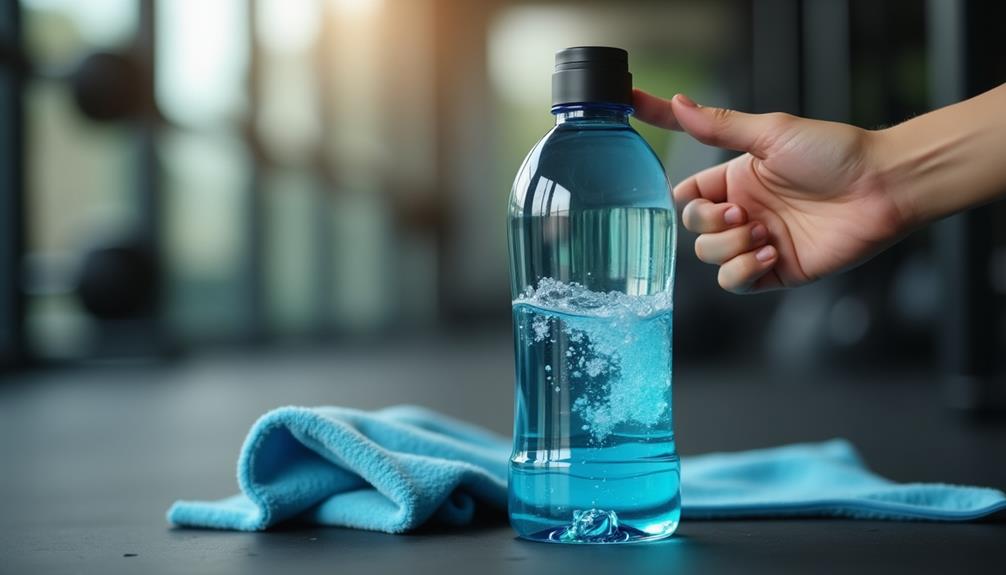To guarantee effective muscle repair post heavy resistance training, follow these five essential tips. First, prioritize nutrition; consume balanced meals with protein, carbs, and healthy fats. Next, hydrate adequately by drinking 16-24 ounces of water and consider low-sugar electrolyte drinks. Third, incorporate active recovery through low-intensity exercises like walking or yoga to improve blood flow. Fourth, prioritize quality sleep by creating a restful environment and establishing a routine. Finally, consider supplements like protein or omega-3s to support recovery, but consult with a healthcare professional first. Stick around, and you'll discover even more valuable strategies for your recovery journey.
Core Insights
- Prioritize nutrition with a balanced meal rich in protein, carbohydrates, and healthy fats to aid muscle recovery and energy replenishment.
- Hydrate adequately by drinking 16-24 ounces of water post-workout and consider low-sugar electrolyte drinks for mineral replenishment.
- Incorporate active recovery through low-intensity exercises like walking or yoga to promote blood flow and reduce muscle soreness.
- Get quality sleep by establishing a consistent routine and creating a calm, dark, and cool environment to enhance recovery.
- Consider supplements such as protein, BCAAs, and omega-3 fatty acids to support muscle repair and reduce inflammation, after consulting a healthcare professional.
Prioritize Nutrition

After a tough workout, prioritizing nutrition is vital for muscle recovery and growth. Your body needs the right nutrients to repair muscle fibers and replenish energy stores. Focus on consuming a balanced meal that includes protein, carbohydrates, and healthy fats within 30 minutes post-exercise. Multivitamins for athletes can also play an essential role in supporting overall nutrition and performance.
Protein is critical for muscle repair; aim for sources like chicken, fish, or plant-based options. Carbohydrates refuel your energy reserves, so include whole grains or fruits. Healthy fats from avocados or nuts can also support overall recovery.
Consider meal timing and portions to maximize benefits. Don't skip meals; consistent nutrition throughout the day helps maintain energy levels and promotes ongoing recovery. With the right focus on nutrition, you'll enhance your results and feel stronger in subsequent workouts.
Hydrate Adequately

- Drink Water: Aim for at least 16-24 ounces of water within 30 minutes post-workout. This helps replace fluids lost through sweat. For ideal hydration, consider electrolyte replenishment drinks that contain essential minerals like sodium, potassium, and magnesium. These can help restore electrolyte balance more effectively than water alone.
- Consider Electrolytes: If your workout was particularly intense, an electrolyte drink can help restore essential minerals. Look for options low in sugar for the most favorable results.
- Monitor Urine Color: A light yellow color indicates good hydration. Darker urine means it's time to drink more fluids.
Incorporate Active Recovery

Hydration plays a pivotal role in recovery, but incorporating active recovery techniques can further enhance your muscle repair after heavy resistance training. Active recovery includes low-intensity exercises that promote blood flow to your muscles. This helps reduce soreness and speeds up recovery.
Here's a quick reference table to guide you on active recovery activities:
| Activity | Duration |
|---|---|
| Light jogging | 20-30 minutes |
| Swimming | 30 minutes |
| Cycling (easy pace) | 30 minutes |
| Yoga or stretching | 30-60 minutes |
| Walking briskly | 30-60 minutes |
Integrating these activities into your routine can keep you moving and support your body's healing process effectively. Remember, consistency is key!
Get Quality Sleep

- Establish a Routine: Go to bed and wake up at the same time each day. Consistency helps regulate your body's internal clock. Consider incorporating natural sleep aids like chamomile tea or lavender essential oils into your bedtime routine to promote relaxation.
- Create a Sleep-Friendly Environment: Make your bedroom dark, cool, and quiet. Consider using blackout curtains and white noise machines to block distractions.
- Limit Screen Time Before Bed: Reduce exposure to screens at least an hour before you sleep. Blue light can interfere with your ability to fall asleep.
Consider Supplements

Supplements can play an essential role in muscle repair after heavy resistance training. They provide your body with the nutrients it needs to recover effectively. Consider protein supplements like whey or plant-based options. They help rebuild muscle fibers damaged during your workouts.
Branched-chain amino acids (BCAAs) are another excellent choice. They can reduce muscle soreness and promote quicker recovery. Creatine is also beneficial, as it enhances strength and muscle mass over time.
Don't forget about omega-3 fatty acids, which can reduce inflammation. A good multivitamin can fill in any nutritional gaps, ensuring your body has everything it needs. Always consult with a healthcare professional before starting any new supplement regimen, so you can tailor it to your specific needs and goals.
Frequently Asked Questions
How Long Does Muscle Repair Usually Take After Heavy Resistance Training?
Muscle repair usually takes about 24 to 72 hours after heavy resistance training. Factors like your age, nutrition, and workout intensity can influence recovery time. Listen to your body, and don't rush the healing process.
What Are the Signs of Inadequate Muscle Recovery?
If you're feeling like a zombie after workouts, it's a sign of inadequate muscle recovery. Look for persistent soreness, fatigue, decreased performance, and increased injuries. Your body's telling you it needs more time to heal.
Can Stress Affect Muscle Repair and Recovery?
Yes, stress can greatly affect your muscle repair and recovery. When you're stressed, your body produces cortisol, which can hinder protein synthesis and slow down healing, making it harder for your muscles to recover effectively.
Is It Safe to Train Sore Muscles Again?
Training sore muscles isn't forbidden, but listen to your body. If you feel sharp pain, it's a sign to rest. Light activity can help, but pushing too hard might lead to injury. Prioritize recovery.
How Can I Prevent Muscle Soreness After Workouts?
To prevent muscle soreness after workouts, you should warm up properly, stay hydrated, maintain a balanced diet, incorporate stretching, and gradually increase workout intensity. Listening to your body's signals can also help you adjust accordingly.

